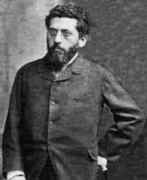Person: König (2), Julius

Julius König was a Hungarian mathematician who worked on algebra, number theory, geometry, set theory and analysis.
Mathematical Profile (Excerpt):
- The course that König followed in the Medical School of Vienna University included a thorough study of mathematics and the natural sciences.
- Perhaps the most significant event which turned König's interests firmly towards mathematics happened in 1869 when Königsberger left Greifswald to take up the appointment of a chair of mathematics at Heidelberg.
- Königsberger had been greatly influenced by Weierstrass's lectures on elliptic functions and this was the topic which interested him at this time, so he in turn influenced König to also undertake research on elliptic functions.
- König worked on his doctoral dissertation under Königsberger's supervision and submitted his thesis Zur Theorie der Modulargleichungen der elliptischen Functionen Ⓣ(On the theory of modular equations of elliptic functions) to Heidelberg in 1870.
- After being awarded a doctorate from Heidelberg König went to Berlin where he spent six months attending lectures by Weierstrass and Kronecker.
- König joined the University at a time when there were other talented and enthusiastic mathematicians on the staff.
- König took a lead in a new venture which these mathematicians embarked on, namely the founding of a new mathematical journal Müegyetemi Lapok.
- It was with great sadness that König was forced to admit that the venture which he had thought so highly of could not continue after so short a time.
- Perhaps it was to teaching, rather than to research, that König made the most important contributions.
- König worked on a wide range of topics in algebra, number theory, geometry, set theory, and analysis.
- König developed Kronecker's polynomial ideals and presented many results on discriminants of forms, elimination theory and Diophantine problems.
- König's work on polynomial ideals influenced Hilbert, Lasker, Macaulay, Emmy Noether, van der Waerden and Gröbner but they simplified his ideas so König's work is now only of historical interest.
- In the last eight years of his life König's interests turned towards set theory and he contributed to the continuum hypothesis.
- König's proof contains an error in that he applied a theorem due to Felix Bernstein in a case where it does not hold.
- König retired from his post at the Technical University in 1905 but he continued to lecture there particularly on topics that he was interested in.
- We should mention König's contribution to mathematics teaching at secondary schools in Hungary.
- We mentioned at the beginning of this article that in his young days König had a love of literature, so it is easy to see why one of his sons might have followed this career.
- König retained his love of literature and reading was throughout his life his favourite hobby.
Born 16 December 1849, Györ, Hungary. Died 8 April 1913, Budapest, Hungary.
View full biography at MacTutor
Tags relevant for this person:
Origin Hungary
Thank you to the contributors under CC BY-SA 4.0! 

- Github:
-

- non-Github:
- @J-J-O'Connor
- @E-F-Robertson
References
Adapted from other CC BY-SA 4.0 Sources:
- O’Connor, John J; Robertson, Edmund F: MacTutor History of Mathematics Archive
